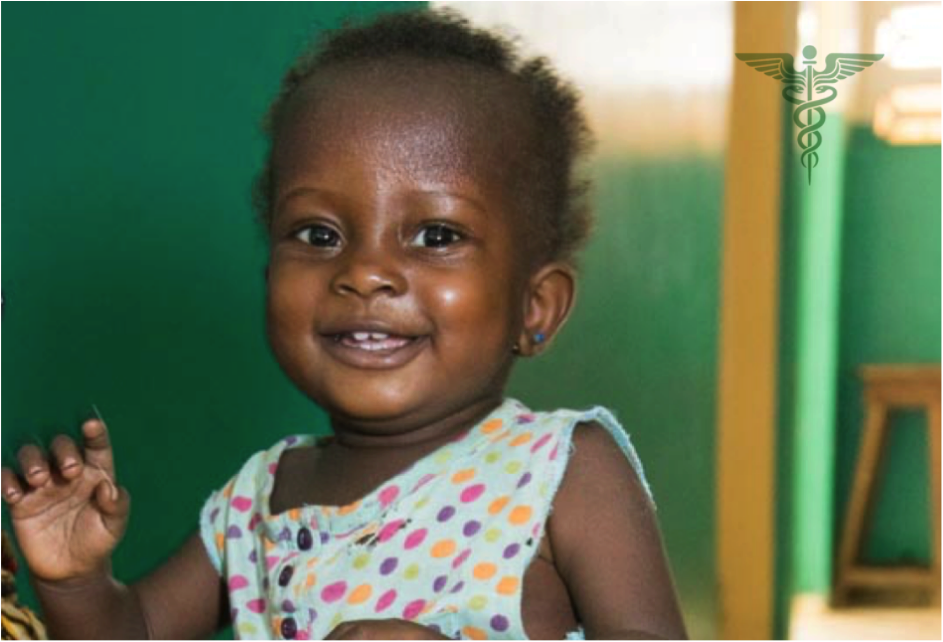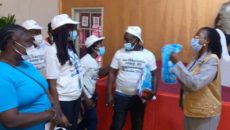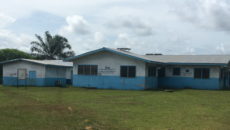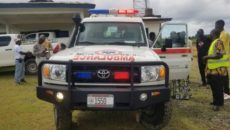Her white and pink striped shirt draped over her left shoulder like an oversized curtain. As she sat on her mother’s lap, Love stared up at the stethoscopes hung around our necks. She had the apprehension you’d expect to see in the eyes of an infant with four strangers by her bedside.
“We just celebrated her first birthday,†her mother told the Ministry of Health doctor and nurses we were rounding with at St. Francis Health Center in Rivercess, Liberia. “She weighs only half of what she should,†explained one of the nurses as she presented Love’s case to the Medical Director, Dr. Fahnbulleh. Love had been admitted to the malnutrition ward five days ago. She had come from her home village Gleekloh – and the journey was not an easy one.
A fishing community of about 100 people, Gleekloh lies on Liberia’s Atlantic coast. To reach St. Francis Health Center, Love’s mother had to carry her on her back in a lapa-cloth. She hiked with Love for an hour along a sandy beach, took a canoe across the Po River, walked another 4-hours through a dirt footpath in the rainforest in Yarnee District, and then crossed the Cestos River in yet another canoe.
Distance can kill. That’s the dire message we heard from Love’s local community health worker, Agatha Blamo. Agatha would know. Last year in Gleekloh, Agatha’s sister died from internal bleeding due to a pregnancy complication that had gone undiagnosed in her community until it was too late.
“I didn’t want my sister’s life to go in vain.†That’s why Agatha decided to become a community health worker. Over the past several months, Agatha and hundreds of others have been recruited to become community health workers and provide primary health care to Liberia’s hardest-to-reach communities.
Like Agatha, who has only completed 9th grade, many of these health workers have had limited opportunity to pursue formal education, don’t have jobs, and come from geographically isolated communities. But they share a passion for serving their people, a desire to work, and a commitment to learning.
In Rivercess, the Liberian Ministry of Health, Last Mile Health, and partners have trained Agatha and hundreds of other community health workers to treat common childhood illnesses. As they have in districts like Konobo, in the coming months, the CHWs will learn to help prevent, diagnose and treat a broad set of illnesses – HIV/AIDS to complications of pregnancy and childbirth to chronic diseases like mental health disorders.
Agatha’s training is supported by in-the-community coaching and mentorship from her supervisors, Josephine, a Physician Assistant, and Savior, a Registered Nurse, who connect her and her patients to referral clinics.
While reviewing her patient register, it was clear that in a few weeks since her training, Agatha had cared for several dozen children with severe illnesses like malaria, pneumonia, and severe acute malnutrition.
In late January, during a quality assurance visit, Savior and Josephine grilled Agatha with questions. Savior and Josephine used their 30-question checklist to ask and score Agatha on her clinical knowledge, her ability to manage her stock of medicines and supplies, her diagnostic and treatment skills manner, and her ability to correctly triage and refer patients to a higher level of care (e.g. clinics) when they needed it.
It was during that visit that Agatha identified Love. She explained that on a recent visit to Love’s home, she had observed that the child had a fever with a cough and treated Love for malaria and pneumonia. On her next visit, she noted that Love’s condition had not improved. At that point, Agatha measured Love’s middle upper arm circumference with a numbered strap.
Appearing like a tape measure, the MUAC strap wraps around a child’s upper arm to test for malnourishment. It reads green if a child is well nourished, and yellow or red, respectively, if the child is suffering from moderate or severe malnutrition. Love’s MUAC was red – an ominous sign. With the support of her clinical supervisor, Josephine, and Gleekonh’s Community Health Committee members, Agatha made a plan to get Love and her mother to St. Francis Health Center.
When Love arrived at St. Francis, her weight was only 5.8 kg – hardly more than her weight of 5.1 kg at the age of 7 months. Equally alarming, Love’s MUAC was 110, a full 10 mm less than what it had been two months prior. Love’s condition, medically known as severe acute malnutrition, was promptly treated with antibiotics, vitamins, and therapeutic formula to combat her malnutrition, an illness responsible for 45% of mortality worldwide in children under age five.
With the comprehensive care provided by health workers at the Ministry of Health, UNICEF, HEAL, and Last Mile Health, she would gain more weight in her three-week stay than she had in the previous five months. Soon, Love was able to begin eating “Ready to Use Therapeutic Foodâ€, a peanut butter-like substance full of the nutrients that Love needs to grow. Well on her way to recovery, she was discharged from St. Francis Health Center on the condition that Agatha would continue to monitor her progress actively and ensure Love remains on track.
We remain humbled by the confluence of actors and actions that came together to deliver primary health care to Love: Agatha’s resolve to become a Community Health Worker; Savior’s and Josephine’s persistence in providing clinical coaching to Agatha; the medicines and supplies that needed to be delivered and maintained in Gleekloh; the sacrifices Love’s mother made to trek with her sick child to the distant health center; and the skill of the nurses and doctors at the St. Francis Health Center (and the partners supporting them) – all were necessary to ensure Love’s path to recovery.
Of course, the work is only beginning. In a ward that was empty only a few months ago, St. Francis Health Center has two more malnourished children in their care who were referred by community health workers.
In isolated communities, there are thousands of children like Love, who “weigh only half what they should.†And nearly one-third of Liberia’s population lives in hard-to-reach communities like Gleekloh – cut off from primary health services.
To ensure that patients in remote areas receive the care they need, Community Health Workers like Agatha, supported by and integrated with strong networks of clinical supervisors and medical professionals, are overcoming barriers and giving hope through healthcare. If Love’s story has any lesson to offer, it’s that integrated community-based health care can save lives.
This story was originally published on Last Mile Health’s blog and was co-authored by Dr. Ami Waters, a UCSF Global Health Fellow with Last Mile Health.
Featured photo courtesy of Last Mile Health



